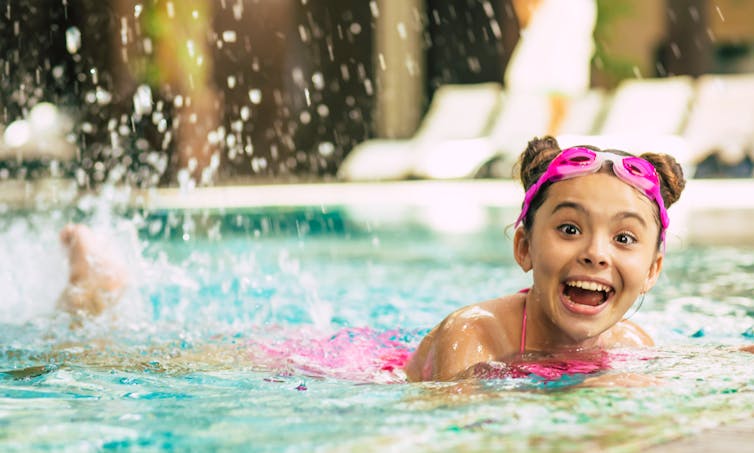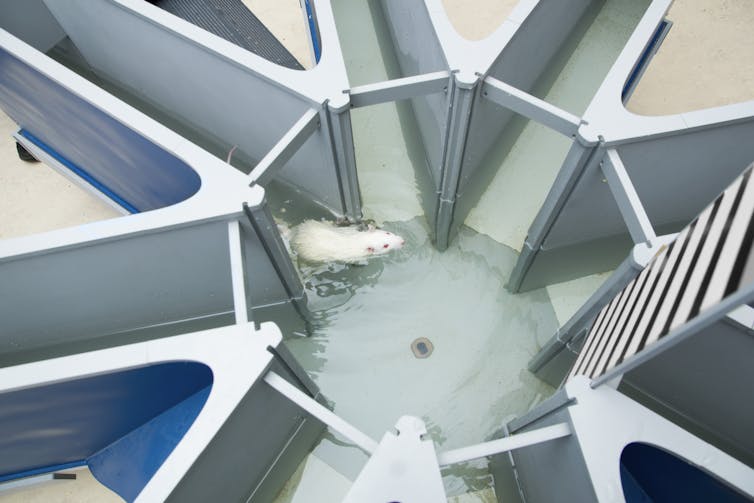How Much Does It Cost To Get A Jennair Downdraft Stove Repaired
It'due south no underground that aerobic exercise tin can assist stave off some of the ravages of crumbling. But a growing body of inquiry suggests that swimming might provide a unique heave to brain wellness.
Regular swimming has been shown to improve memory, cognitive function, immune response and mood. Swimming may likewise help repair damage from stress and forge new neural connections in the brain.
Simply scientists are notwithstanding trying to unravel how and why swimming, in detail, produces these brain-enhancing effects.
Equally a neurobiologist trained in brain physiology, a fitness enthusiast and a mom, I spend hours at the local puddle during the summer. It'southward not unusual to run across children gleefully splashing and swimming while their parents sunbathe at a distance – and I've been i of those parents observing from the poolside plenty of times. But if more adults recognized the cerebral and mental health benefits of swimming, they might be more than inclined to jump in the pool alongside their kids.
New and improved brain cells and connections
Until the 1960s, scientists believed that the number of neurons and synaptic connections in the man brain were finite and that, once damaged, these brain cells could non be replaced. But that idea was debunked every bit researchers began to come across ample bear witness for the birth of neurons, or neurogenesis, in adult brains of humans and other animals.
Now, at that place is clear evidence that aerobic exercise can contribute to neurogenesis and play a key role in helping to reverse or repair damage to neurons and their connections in both mammals and fish.
Research shows that i of the key means these changes occur in response to exercise is through increased levels of a poly peptide called brain-derived neurotrophic factor. The neural plasticity, or ability of the brain to alter, that this protein stimulates has been shown to boost cerebral function, including learning and memory.

Studies in people take plant a strong human relationship between concentrations of encephalon-derived neurotrophic factor circulating in the encephalon and an increase in the size of the hippocampus, the brain region responsible for learning and memory. Increased levels of encephalon-derived neurotrophic cistron have besides been shown to sharpen cognitive functioning and to help reduce anxiety and depression. In contrast, researchers take observed mood disorders in patients with lower concentrations of brain-derived neurotrophic gene.
Aerobic exercise also promotes the release of specific chemic messengers called neurotransmitters. One of these is serotonin, which – when present at increased levels – is known to reduce depression and anxiety and improve mood.
In studies in fish, scientists take observed changes in genes responsible for increasing brain-derived neurotrophic factor levels besides as enhanced development of the dendritic spines – protrusions on the dendrites, or elongated portions of nerve cells – after 8 weeks of exercise compared with controls. This complements studies in mammals where encephalon-derived neurotrophic cistron is known to increase neuronal spine density. These changes have been shown to contribute to improved memory, mood and enhanced cognition in mammals. The greater spine density helps neurons build new connections and transport more signals to other nervus cells. With the repetition of signals, connections can become stronger.
But what's special almost swimming?
Researchers don't nonetheless know what swimming'southward secret sauce might be. Merely they're getting closer to agreement information technology.
Swimming has long been recognized for its cardiovascular benefits. Because swimming involves all of the major musculus groups, the heart has to work hard, which increases blood flow throughout the body. This leads to the cosmos of new blood vessels, a process called angiogenesis. The greater blood flow tin can besides lead to a large release of endorphins – hormones that deed equally a natural hurting reducer throughout the body. This surge brings about the sense of euphoria that often follows do.
Most of the enquiry to understand how swimming affects the brain has been done in rats. Rats are a good lab model because of their genetic and anatomic similarity to humans.

In one study in rats, pond was shown to stimulate brain pathways that suppress inflammation in the hippocampus and inhibit apoptosis, or prison cell death. The written report besides showed that pond can help support neuron survival and reduce the cerebral impacts of crumbling. Although researchers do not yet have a way to visualize apoptosis and neuronal survival in people, they do notice similar cognitive outcomes.
1 of the more than enticing questions is how, specifically, swimming enhances brusque- and long-term retention. To pinpoint how long the beneficial effects may final, researchers trained rats to swim for hr daily for 5 days per week. The squad then tested the rats' memory by having them swim through a radial arm water maze containing 6 arms, including one with a subconscious platform.
Rats got six attempts to swim freely and find the hidden platform. Afterwards just seven days of swim training, researchers saw improvements in both brusque- and long-term memories, based on a reduction in the errors rats made each day. The researchers suggested that this boost in cognitive role could provide a footing for using swimming every bit a fashion to repair learning and memory impairment caused by neuropsychiatric diseases in humans.
Although the leap from studies in rats to humans is substantial, research in people is producing like results that suggest a clear cognitive benefit from pond across all ages. For instance, in one study looking at the touch of swimming on mental acuity in the elderly, researchers concluded that swimmers had improved mental speed and attention compared with nonswimmers. However, this study is limited in its enquiry design, since participants were not randomized and thus those who were swimmers prior to the study may accept had an unfair border.
Some other study compared cognition between land-based athletes and swimmers in the immature adult historic period range. While water immersion itself did not make a difference, the researchers found that 20 minutes of moderate-intensity breaststroke swimming improved cognitive office in both groups.
Kids get a heave from pond too
The brain-enhancing benefits from swimming appear to also boost learning in children.
Another inquiry group recently looked at the link betwixt physical activity and how children learn new vocabulary words. Researchers taught children age six-12 the names of unfamiliar objects. So they tested their accuracy at recognizing those words afterwards doing 3 activities: coloring (resting activity), swimming (aerobic activity) and a CrossFit-similar exercise (anaerobic activity) for three minutes.
[The Conversation's science, health and technology editors option their favorite stories. Weekly on Wednesdays.]
They institute that children's accuracy was much higher for words learned following swimming compared with coloring and CrossFit, which resulted in the same level of retrieve. This shows a clear cognitive benefit from swimming versus anaerobic exercise, though the report does not compare swimming with other aerobic exercises. These findings imply that swimming for even short periods of time is highly beneficial to immature, developing brains.
The details of the time or laps required, the style of swim and what cognitive adaptations and pathways are activated by swimming are still being worked out. But neuroscientists are getting much closer to putting all the clues together.
For centuries, people have been in search of a fountain of youth. Swimming just might be the closest we can get.
Source: https://theconversation.com/swimming-gives-your-brain-a-boost-but-scientists-dont-know-yet-why-its-better-than-other-aerobic-activities-164297
Posted by: pollitthicand.blogspot.com


0 Response to "How Much Does It Cost To Get A Jennair Downdraft Stove Repaired"
Post a Comment